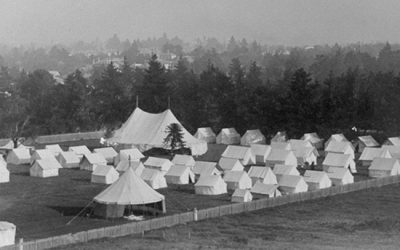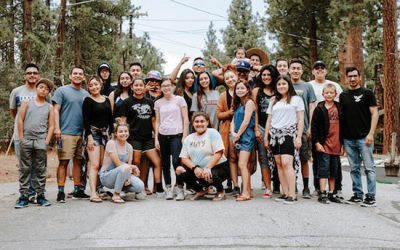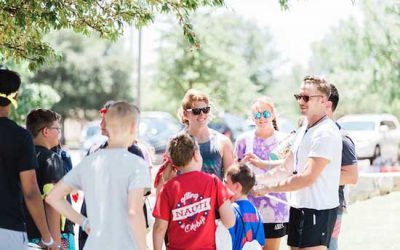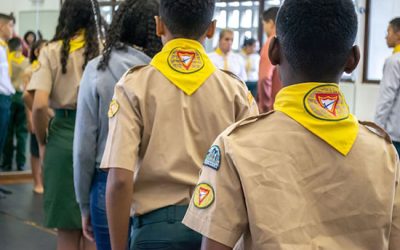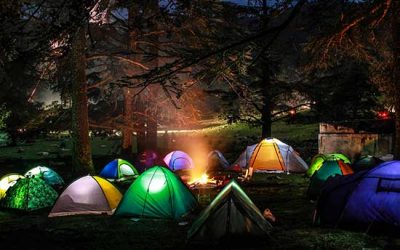Friday rolls around, and you’re spending time with your friends or relatives when they mention they’re going to vespers this evening.
They said the word so nonchalantly. Maybe that made you feel like you should know what it means. Maybe that’s what brought you here now.
Vespers comes from the Latin vesper, meaning “evening star,” and vespera, meaning “evening.” Today it refers to an evening prayer time, or “evensong” in Roman Catholic, Orthodox, Lutheran, and Anglican churches. It could take place any evening and usually happens around sundown, involving prayer, celebration, thanksgiving, or praise of God.
As we’ll see next, Adventists are more specific when they use the word.
Vespers for Adventists is a special time of worshiping God to begin or end the Sabbath. It can range from a quiet time of Bible reading to a casual home gathering, or even a formal worship service.
We’ll dive into the specifics of vespers and why it’s so important to Seventh-day Adventists. You’ll learn:
- The meaning of vespers
- Why Adventists hold vespers
- What happens during vespers
- Where to find a vespers program
Let’s start with what the word itself means.
What does “vespers” mean for Adventists?

Photo by Douglas Bagg on Unsplash
When Adventists talk about vespers, they’re referring to a time of informal worship or formal liturgy that either begins the Sabbath or ends the Sabbath—Friday night vespers (the most common) or Sabbath night vespers.
They celebrate it at sundown because the biblical Sabbath runs from sunset to sunset. In our clock-controlled world, we begin our days at midnight. But in biblical times, the new day began with the setting of the sun.
This goes back to Creation.
Each day of the Creation week concluded with the words “there was evening and there was morning, the [first, second, third, etc.] day” (Genesis 1:31 NKJV). After the evening and morning of the sixth day, God rested on the seventh day and set it apart as holy (Genesis 2:1–3). This 24-hour period is the same Sabbath that we welcome during vespers.
Why do Adventists participate in vespers?
Friday evening vespers, beginning at sunset, celebrates the start of the seventh day, the Sabbath—a day to set apart from the rush of life and focus on our relationships with God and with other people. Vespers serves as the boundary between day-to-day busyness and the Sabbath.
Here’s how.
Hurry permeates our lives. So many people have demanding jobs, or work overtime. To add to that, we often rush from there to pick the kids up from school to take them to sports practices. And don’t forget cooking meals for a hungry family and folding the laundry that’s been on the couch for days!
With all the busyness, it can be hard to slow down and transition our minds onto God.
But vespers paves the way for that transition. We praise and thank God for His guidance and help through the past week. And then, we turn our attention to God and the people around us so that we can be fully present in the blessings of the Sabbath.
At the same time, vespers connects us with like-minded people who want to draw closer to Jesus.
And as Sabbath ends on Saturday evening, we once again pause, this time to thank God for the blessings of the Sabbath and ask for His strength in the new week. We transition out of the Sabbath and back into the day-to-day, refreshed and bringing God’s presence with us.
Who can attend vespers?
Vespers is for anyone! Even if you don’t keep the Sabbath, you can enjoy the activities of a vespers service. Adventists are an inclusive bunch, so we’ll welcome you with open arms, whether you want to participate or just observe.
What happens during vespers?
Vespers can involve a variety of worship-related activities. Some vespers services, particularly those on Adventist college or academy campuses, can be like miniature church services or concerts. But others take place in people’s homes with simple traditions—lighting candles, eating a special meal, singing certain songs, or sharing blessings from the past week.
And note: Vespers doesn’t have to happen with other people. Sometimes, a person may prefer to spend a quiet Friday evening reading the Bible, taking a walk while praying, or listening to music. Or a family may use Friday evening as a way to bond with one another instead of being with a large group.
Regardless of the exact circumstances, here are some possible vespers activities:
- Prayer
- Music
- Bible study
- Testimonies
Prayer
One person might pray to begin and end vespers. Or the vespers could be structured like a prayer meeting, where people share prayer requests and pray together in pairs or small groups.
Music
Many Adventists sing hymns or praise songs to welcome the Sabbath. Some may pull out their instruments, too.
Two common vespers songs from the Seventh-day Adventist Hymnal are “Day Is Dying in the West” and “Abide with Me.” The hymnal also has a section of songs about the Sabbath with “Don’t Forget the Sabbath” and “Safely Through Another Week” being the most popular.
Bible study
In a family or home setting, this could be as simple as reading a Bible passage, devotional, or story and discussing it. Some may host a small group Bible study for vespers, too.
In a more formal program, an individual might share a short message or sermon.
Testimonies
Sometimes, a vespers program can be a testimony service, where people have the opportunity to share how God is working in their lives. Or even what they’re thankful for or lessons they’ve learned.
Where to find a vespers program
Vespers programs are held in numerous places: churches, Adventist college and high school campuses, people’s homes, or out in nature. They can even happen over ZOOM and livestream. To find a vespers program near you, contact your local Seventh-day Adventist Church. Their websites’ calendars and Facebook pages can help you, too.

Photo by Helena Lopes on Unsplash
Experience the joy of the Sabbath through vespers
Vespers is a special part of Adventist Sabbath-keeping. Throughout the week, we look forward to this time, and when Sabbath ends, we ride on its strength into the new week.
But it’s more than just a tradition.
It boils down to relationships—vespers allows us to connect with Jesus on a deeper level and foster a sense of community.
So, why not attend a vespers program yourself? It could be just the experience you’ve been looking for.
Find a Church
If you’re interested in finding a local Adventist church near you, you can use the Adventist Locator provided by the General Conference of Seventh-day Adventists.
Related Articles
More Answers
Seventh-day Adventist World Population and Demographics
The Adventist Church has more than 22 million members and 100,000 churches worldwide, plus a large system of hospitals, schools, and publishing houses. Learn more about this diverse church.
What Is a Seventh-day Adventist Camp Meeting?
Although camp meetings didn’t begin with the Seventh-day Adventist Church, they’re as much an Adventist thing as haystacks.
Camp meeting is an extended event for Adventists (and non-Adventists) of all ages to gather and participate in spiritual seminars and activities. During the event, attendees often camp in tents, campers, or RVs.
How to Join the Seventh-day Adventist Church
Whether you heard about the Seventh-day Adventist Church through a traveling evangelist, during your online searches, or through a loved one or relative, you might be considering joining yourself.
How Do Adventists Do Baby Dedications?
For Christians, dedication ceremonies for babies, also for older children, are an important time for parents and the church. It’s a special part of the worship service when parents present their young children to God and the church family. Both parents, along with the congregation, regard this as a solemn promise to be a Christ-like example to the child.
Do Adventists Celebrate Communion and Foot Washing?
Like many Christian denominations, Adventists regularly participate in communion, also referred to as the “Lord’s Supper” or the “Last Supper.” They also practice foot washing (John 13:1-20), or the “ordinance of humility,” during the service—which isn’t as common.
What is the Concept of “Present Truth” and Why is it Important?
Present truth is the principle that certain biblical truths are relevant to God’s people at specific times in history. God sends the Holy Spirit to reveal truths that help us better understand how to interpret and apply His Word in a present moment.
Do Seventh-day Adventists Celebrate Easter
Yes, many Seventh-day Adventists do celebrate Easter.
Does the Adventist Church Have Youth Ministry Programs?
The Seventh-day Adventist Church has been organizing and operating youth ministry programs since 1879.
In our opinion, youth ministry is one of the most important ministries a church can have.
Do Adventists Celebrate Birthdays?
Yes, most Seventh-day Adventists do celebrate birthdays because we see them as excellent reminders of the life God has blessed us with. And we celebrate them the same way everyone else does—with friends, family, presents, and a special meal.
What Do Adventists Offer for Young Adults?
In recent years, the age group often classified as “young adults” has been trickier to engage. It’s been a significant concern for Christian churches around the world. Though interestingly enough, similar observations regarding young adults have been coming up in conversations about the economy, the entertainment industry, politics, and more.
Do I Need to be an Adventist to be Saved?
The answer to this question is simply, “no.”
When it comes to salvation in Jesus Christ, all that is required of a person is to acknowledge Jesus’ sacrifice for us, believe that He has saved us, and claim the free gift of salvation that is always available to us. Salvation is not based on denomination.
Do You Have to Be Vegetarian to Be Adventist?
Of course not. Membership in the Seventh-day Adventist Church has never included any dietary requirements. However, there might be some reasons people might think that. So many Adventists are vegetarians or even vegan, and a plant-based lifestyle has many health benefits.
All About Seventh-day Adventist Colporteurs
The Seventh-day Adventist Church uses a variety of methods to spread the hope of the gospel to the world. One of these ways is through colporteuring, also called “canvassing” or “literature evangelism.”
What Is an Adventist Book Center (ABC)?
When you walk into any one of the many Adventist Book Center (ABC) locations, chances are you’ll be greeted by pleasant gospel music in the background, friendly employees, and row after row of Christian books, movies, Bibles, study guides, kids’ games, and more.
Do Seventh-day Adventists Celebrate Holidays?
Wondering whether your Adventist classmate or coworker keeps the same holidays you do? Perhaps you want to include them in some festivities, but you also want to respect their beliefs. Thus, you’re unsure of how to navigate the holiday question. Will they accept your invitation to the office Christmas party?
The Adventist Haystack (It’s Not What You Think) + 4 Recipes
Haystacks are basically a taco salad—with an Adventist spin on it! Most versions are vegetarian and offer an endless combination of tasty toppings. We eat them often because they’re healthy, scrumptious, and easy to make.
Do Seventh-day Adventists Believe in Medical Care?
The Seventh-day Adventist Church believes in and supports evidence-based medical care. In fact, medicine has played a significant part in our history, and today we run a major health system with hospitals, medical schools, and clinics throughout the world.
All about Adventist Elementary Schools
The Seventh-day Adventist Church operates the largest Protestant education system in the world. A big part of this system is our K-8 elementary schools, or primary schools, as they’re known in other parts of the world.
What Are Pathfinder and Adventurer Clubs?
Like the boy or girl scouts, Pathfinders and Adventurers learn about nature and life skills. But what makes these clubs special is their purpose to bring young people closer to Jesus.
A Look at Adventist Colleges and Universities
On the outside, Seventh-day Adventist universities may not look much different than other college campuses. But the real differences are beneath the surface.
What Is ASI (Adventist-Laymen’s Services and Industries)?
ASI, which stands for Adventist-laymen’s Services and Industries, is a membership-based organization that provides support for Seventh-day Adventist laypeople (Adventist professionals who aren’t pastors).
What Are Adventist Evangelistic Meetings?
The Seventh-day Adventist Church puts a huge emphasis on sharing the gospel through evangelism, or sharing the gospel through preaching, teaching, and testimony. One of the ways we accomplish this is by organizing public events called evangelistic meetings.
Christian Summer Camps—A Cherished Adventist Ministry
School’s out, the sun’s shining, and your kids are thrilled to have the summer ahead of them. Then three days in, you hear, “I’m bored…”
Do Adventists Have Their Own Bible?
Adventists have some unique beliefs—you might be able to name some of them right now. The seventh-day Sabbath. Death as a sleep. Hell as nonexistence.
Adventist Pastors
What is the role of a pastor in the Adventist Church? The position itself, at least as far as a local congregation is concerned, is not much different from that of pastors in other protestant denominations.
The Leadership Structure of the Seventh-day Adventist Church
The Seventh-day Adventist Church has a representative form of structure that connects its 90,000-plus congregations across the globe and gives its members a part in decision-making. Though the Church was incorporated in 1863, this system came about during the church’s reorganization from 1901 to 1903. It includes four levels of organization.
What to Expect When You Go to an Adventist Church
If you’re attending an Adventist church for the first time, you may wonder what it’s really like. While each Adventist church is unique in its collective personality and local culture, Adventist church services are generally similar to most other Protestant church services.
Adventist Education
Seventh-day Adventists have historically upheld the importance of a well-rounded, high-quality education. Instead of a one-size-fits-all approach to teaching and learning, the Adventist Education system operates on the principle of educating the “whole” person.
Evangelism
Evangelism is simply sharing the truths of the Bible with someone else. And Adventists are all into it.
Didn’t find your answer? Ask us!
We understand your concern of having questions but not knowing who to ask—we’ve felt it ourselves. When you’re ready to learn more about Adventists, send us a question! We know a thing or two about Adventists.





